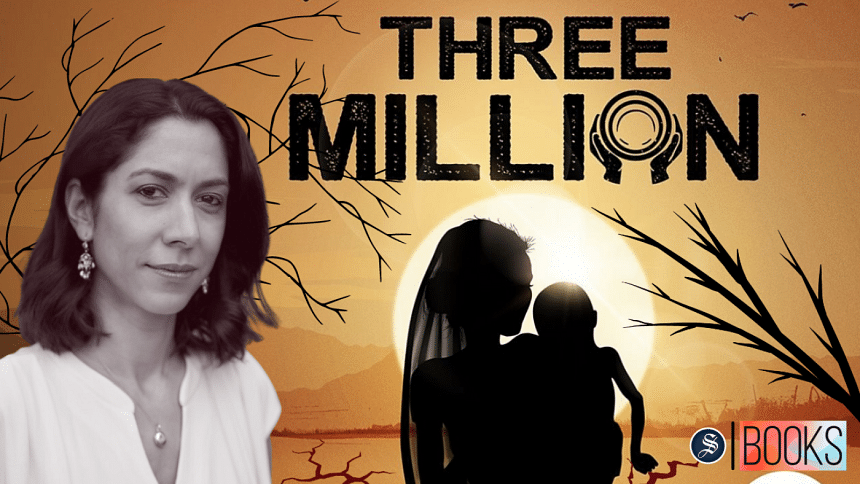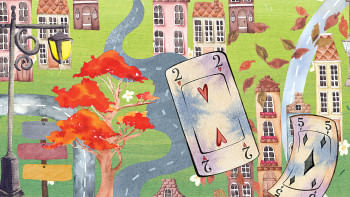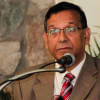"It's the start of a conversation": Journalist Kavita Puri on producing a podcast series on the Bengal famine

There seems to exist a collective amnesia around the immense horror and tragedy that we have endured during British colonial rule. Yet, the trauma from these events hasn't spared us still, and it persists in our collective psyche.
The Bengal famine of 1943-44 claimed over three million lives under the British colonial rule, a horrific episode followed by years of hunger and disease. While statistics and scholarly analysis dominate discussions about the Bengal Famine, a crucial gap remains–the personal stories of those who endured this unimaginable tragedy.
In the latest documentary podcast series "Three Million", journalist Kavita Puri seeks to answer this haunting question: "How do three million people just disappear?" by talking to some of the last surviving witnesses, including Nobel Laureate Amartya Sen.
The journalist, who previously worked on the podcast series "Partition Voices" and a book of the same title, employs her skills to shed new light on the policies that "manufactured" this famine, and presents perspectives previously unexplored—such as recorded interviews with Indian civil servants. Puri confronts the painful legacy of the Bengal Famine nearly eight decades after it happened, reigniting a dialogue on this often under-analysed chapter of our history.
She agreed to speak on the topic of the Bengal famine and what went into making the podcast, among others, to shed some much-needed light on the issue.
What inspired you to produce a series about the Bengal Famine?
The famine was a huge event in the 20th century—in South Asian history, but also in the story of World War II—at least three million people died, which is one of the largest losses of civilian life on the Allied side. Today, it is rarely remembered in terms of the victims. There isn't a memorial, museum or even a plaque anywhere in the world dedicated to them. If it is remembered, it's often about the many causes and who was to blame. I wanted to shift the lens and tell the story from the perspective of the people who lived through it, in their own words.
At the very outset of this podcast, you say,"It's scary wading into this subject." Could you explain what aspects of "Three Million" felt daunting?
Type the words "Bengal" and "famine" into social media and you will see how divisive the debate is, and how it quickly zeros in on the role of the wartime Prime Minister Winston Churchill—people both blaming and defending him. The role of Churchill in Britain is bound up in our national story of the war; he is a figure that is revered. Even though I wasn't really looking into Churchill's role in the famine, even talking about the subject can be sensitive. There's never been a series made on television or radio about it here in the UK. "Three Million" was the first one, after over 80 years.
What were some of the biggest challenges you faced while working on this project?
The main challenge was that I was telling the complicated story of the famine through first person testimony. I was doing it 80 years on, so many people who were alive during that time had died. It was also important for me to have survivor testimony in the series, not just eyewitnesses from better off families. Finding those accounts was hard.
There is one specific policy enacted by the British Empire that directly contributed to the famine: the "Denial Policy." Can you share more about this policy?The context of the famine is World War II. The Japanese had rapidly swept across Southeast Asia, and in early 1942, Burma fell so the enemy was on the border of British India. Colonial authorities had seen how the Japanese had used local resources to fuel their advance so they gave orders to go into villages and towns across the Bengal delta and confiscate or destroy surplus food and tens of thousands of boats. The aim was to stop the Japanese using food and transport to advance further into India should they invade, but the policy strained the already fragile local economy, and meant that rice—the staple food in Bengal—couldn't be moved around easily once the boats were destroyed. The price of rice, which had already been rising because of wartime inflation, soared, putting it even further out of reach for so many people who were already struggling to survive.
How did the discovery of tapes containing interviews with Indian civil servants shed light on the role of British colonial policies, and what key insights did these interviews provide on the colonial administration's approach to this "artificial" famine?
The Indian civil servants were working across the ground in Bengal. They spoke of chaos and confusion. They were following the famine code, which had been laid out by colonial authorities in the late 19th century to warn of a famine and ways to alleviate it, but the famine was never officially declared, despite all the indicators being met. One civil servant who worked closely with the colonial figure in charge of food supply in Bengal said that the priority at the time was to win the war and keep the Japanese out of India at whatever cost.
You've had conversations with numerous survivors who survived this tragedy, individuals who are among the last remaining from this generation. How integral was the utilisation of oral history in the development of this project?
For me, oral history was essential as it is missing from the official archives. So much discussion about the famine is academic, bound up in facts and figures and questions of causation and blame—these are of course important—but the Bengal famine of 1943 is a humanitarian catastrophe. I wanted to tell that story—what it was like to live through it and what it was like to survive it. The human tragedy has often been missing, in their own words.
In the last part of your podcast the words "acknowledgement" and "remembrance" come up a lot. Why is it important for us to actively engage in remembering and acknowledging this devastating event, since a lot of it may be difficult or painful to confront?The people who died were the poorest and most vulnerable in society. To acknowledge them and remember them, and when we can, put names to the three million, is to afford their lives dignity. So many people dying on that scale raises difficult questions in Britain, and also in Bengal, but 80 years on I hope we can start to address them.
How has the response to the podcast been since its release, and have there been any unexpected or particularly impactful reactions to the podcast's content?The response has been phenomenal around the world, and many people have said they didn't know, others have shared stories about their families. It's the start of a conversation.
"Three Million" is available on BBC World Service.
Usraat Fahmidah is a freelance journalist & writer. You can find them on X @usraatfahmidah.

 For all latest news, follow The Daily Star's Google News channel.
For all latest news, follow The Daily Star's Google News channel. 











Comments